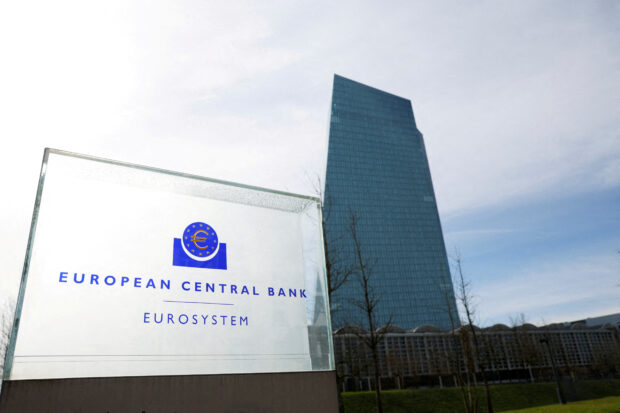ECB raises rates to record high, signals end to hikes

A view shows the logo of the European Central Bank (ECB) outside its headquarters in Frankfurt, Germany March 16, 2023. REUTERS/Heiko Becker/File Photo
FRANKFURT -The European Central Bank raised its key interest rate to a record high of 4 percent on Thursday but, with the euro zone economy in the doldrums, signaled this was likely to be its final move in a more-than year-long fight against inflation.
The central bank for the 20 countries that share the euro also raised its forecasts for inflation, which it now expects to come down more slowly towards its 2 percent target over the next two years, while cutting those for economic growth.
That illustrated the dilemma the ECB faced at the meeting: prices are still rising at more than twice its target rate but with high borrowing costs and a downturn in China, overall economic activity is struggling.
READ: Europe inflation held steady in August as ECB keeps an open mind on rates
Against this backdrop, the ECB sent a message that it was likely done with raising rates, prompting euro zone bond yields to fall and European shares to rise.
“Based on its current assessment, the Governing Council considers that the key ECB interest rates have reached levels that, maintained for a sufficiently long duration, will make a substantial contribution to the timely return of inflation to the target,” the ECB said.
That is now expected to happen more slowly than at the time of the ECB’s previous projections in June, with inflation seen at 5.6 percent in 2023, 3.2 percent in 2024 and 2.1 percent in 2025.
ECB President Christine Lagarde did not absolutely rule out a further hike if needed and said interest rates would have to remain at restrictive levels for some time.
READ: Momentum growing for ECB rate hike pause as growth falters -sources
“The focus is going to move, going forwards, to the duration, but that is not to say – because we can’t say that now – that we are at peak,” she told a press conference.
Lagarde acknowledged that some ECB board members had argued against the latest rate hike but added: “There was a solid majority of governors to agree with the decision we have made.”
Asked to comment on whether the ECB’s downgrading of its growth forecasts – with euro area growth this year now put at only 0.7 percent – meant that a regional recession was now its base-case scenario, Lagarde insisted the slowdown was temporary.
“The recovery we had planned for the second half of 2023 has been pushed out over time,” she said. “We are confident that growth will pick up in 2024.”
Sticky inflation
The upgrade to the 2024 inflation estimate – which had been reported by Reuters earlier – likely played a role in discussions as policymakers weighed the risk that inflation, currently still above 5 percent, would get stuck at a high level.
READ: ECB expects euro zone 2024 inflation to remain above 3% – source
Thursday’s 25-basis-point increase pushes the rate the ECB pays on bank deposits to 4 percent, the highest level since the euro currency was launched in 1999.
Just 14 months ago, that rate was languishing at a record low of minus 0.5 percent, meaning banks had to pay to park their cash securely at the central bank.
In the run-up to this week’s meeting, money markets had expected the deposit rate to peak at 4 percent before being cut in the second half of next year.
In contrast, markets have fully priced in unchanged rates at next week’s meeting of the U.S. Federal Reserve, which started raising earlier and has moved higher than the ECB.
Supporters of a hike this week are likely to have argued it was needed because inflation, including underlying measures that strip out volatile components, remains too high, with a recent surge in energy prices threatening a new acceleration.
READ: EU Commission cuts euro zone growth forecast as Germany in recession
But the brisk tightening cycle – twice as steep as normally envisaged by the ECB’s own stress tests of the banking sector – has already left its mark on the euro zone economy.
With the manufacturing sector, which typically needs more capital to operate, already suffering as a result of higher borrowing costs, lending to companies and households has fallen off a cliff.
Services has now also started to struggle following a brief post-pandemic boom in tourism.
The euro zone’s biggest economy, Germany, was bearing the brunt of an industrial slump and heading for recession, according to several forecasts.